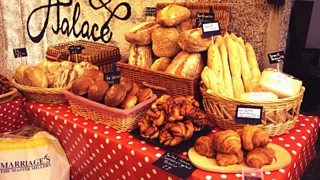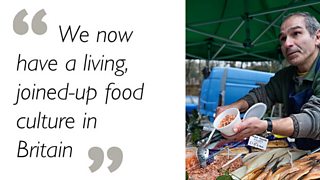15 Years of Food and Farming Awards
Sheila Dillon
Presenter, The Food Programme, Radio 4

Chas & Momo Bakery - baked in Thornton Heath (photo: Chareon Tapaneyasastr)
In 2011 I went with my fellow judge, chef Richard Corrigan, to the Loch Arthur creamery in Dumfries and Galloway. We knew their cheeses were good because we’d tasted two of them in London, in the process of making up our short list of three finalists for best food producer in the Food and Farming Awards. We also knew that the dairy - supplied with milk from their own farm - was part of a Camphill community, a place where people with varying disabilities live as part of regular families in group homes. But what we didn’t know astounded us. In the cheese-making room, after we’d donned our white coats, we saw that almost all the makers of Farmhouse, Killywhan and Crannog were people with the kind of physical and mental difficulties that would have kept them out of most commercial workplaces. In the maturing room it was the same. Yet what they were turning out in the most professional, skilled and knowledgeable way were some of the UK’s greatest cheeses. Richard was so thrilled he bought 5 kilos of them to take back to his restaurant.
Loch Arthur won that year’s producer award and now you can buy their cheeses in delis and specialist shops all over the UK , as well as by mail-order A great story about a business (and it is a business, not a charitable enterprise). People making great food that’s also making a difference to a lot of lives and boosting the local economy - as well as showing that to be severely “handicapped” is not to be useless. In a world that sometimes seems addicted to the quick buck at any cost, the Loch Arthur story says that making a buck more slowly, while caring decently for the animals which supply the raw ingredients and the people who provide the labour and skill, brings widespread benefits, as well as seriously delicious - and nutritious - food.
We’ve always told stories on The Food Programme - some of them about power misused, of short-sightedness, cruelty, greed and ignorance. But what gives us heart for the tough stories are the other kind, like Loch Arthur’s - accounts of people who’ve swum against the tide in the food business. Those who stood up for high standards in farming and food production at a time when the smart money seemed to be all on the side of “efficiency” and cheapness - whatever the long-term environmental and social costs. In 2015 it’s easy to see the price we’re paying every day for those smart money values - from the dramatic decline in many bird species through soil erosion to the obesity epidemic and its inevitable travelling companion type 2 diabetes, the disease that threatens to bankrupt the NHS.
In 1999 - 20 years after the first broadcast of The Food Programme - we decided that we needed to highlight those stories in a way that wasn’t possible on the programme. We wanted to find out from our listeners who the food heroes were in their neighbourhoods. Not just people preserving standards, but those setting new standards, reviving old skills or developing new skills as bakers, meat curers, butchers, shopkeepers, chefs… in fact, anyone, any organisation, that through food was making life in Britain better. We particularly wanted to know about those refusnik cooks in schools, hospitals, care homes and other public catering places who’d declined to go along with the highly processed, factory-made foods that back then were being pressed on them in the name of sacred cheapness and because “that’s what people want”.

Paul serving on Veasey's Fish Stall (photo: Guy Milnes)
For the first awards in 2000 - royally launched by Prince Charles at St James’s Palace - listeners responded with hundreds of nominations. This year we had thousands. And this year as I made my way through more than 1200 nominations for the food producer category alone, I realised that we now have a living, joined-up food culture in Britain. It’s still patchy, but there’s a network of thousands of people in the quality food business who support each other, sharing their skills and knowledge. They also get together to market and sell their goods. They can do that because good food is what an increasingly large number of people want. There’s an eager market out there - even in these tough economic times.
All that good news isn’t just to the credit of the food awards - we aren’t that powerful – but for 15 years Radio 4 listeners have engaged with our search, working as our judges’ eyes and ears to map the changes in Britain’s food landscape. And every year about 12 of those judges - scientists, chefs, public health doctors, food writers and editors, broadcasters, policy experts, caterers - have given days of their time to read the nominations, meet to taste, discuss and draw up short lists and then, finally, travel all over the country. From the Scillies to the Orkneys, to NI’s six counties and the Welsh coast, they have to meet the three finalists in each category, looking over their businesses and asking the questions that can’t be answered at a distance.
Back in the mid-80s, when I first heard it, I wanted to work at The Food Programme because, as a food journalist, I was interested in what it was about and it seemed to embody those Reithian- 主播大秀 values - educating, informing, entertaining - that had mattered a lot to me growing up in a working class household in Lancashire. It was one of the 主播大秀’s best. I think - I hope - the food awards over the last 15 years have added to that reputation.
Sheila Dillon is presenter of The Food Programme on 主播大秀 Radio 4
